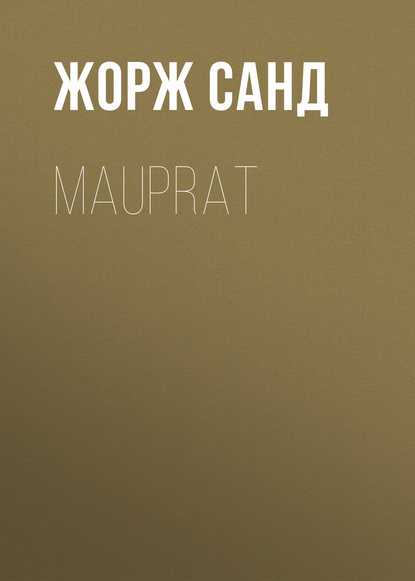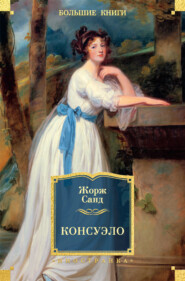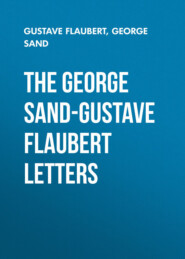По всем вопросам обращайтесь на: info@litportal.ru
(©) 2003-2025.
✖
Mauprat
Настройки чтения
Размер шрифта
Высота строк
Поля
You will not expect me to give an account of the American war. Once again I will separate my existence from the events of history as I relate my own adventures. Here, however, I shall suppress even my personal adventures; in my memory these form a special chapter in which Edmee plays the part of a Madonna, constantly invoked but invisible. I cannot think that you would be the least interested in listening to a portion of my narrative from which this angelic figure, the only one worthy of your attention, firstly by reason of her own worth, and then from her influence on myself, was entirely absent. I will only state that from the humble position which I gladly accepted in the beginning in Washington’s army, I rose regularly but rapidly to the rank of officer. My military education did not take long. Into this, as into everything that I have undertaken during my life, I put my whole soul, and through the pertinacity of my will I overcame all obstacles.
I won the confidence of my illustrious chiefs. My excellent constitution fitted me well for the hardships of war; my old brigand habits too were of immense service to me; I endured reverses with a calmness beyond the reach of most of the young Frenchmen who had embarked with me, however brilliant their courage might otherwise have been. My own was cool and tenacious, to the great surprise of our allies, who more than once doubted my origin, on seeing how quickly I made myself at home in the forests, and how often my cunning and suspiciousness made me a match for the savages who sometimes harassed our manoeuvres.
In the midst of my labours and frequent changes of place I was fortunate enough to be able to cultivate my mind through my intimacy with a young man of merit whom Providence sent me as a companion and friend. Love of the natural sciences had decided him to join our expedition, and he never failed to show himself a good soldier; but it was easy to see that political sympathy had played only a secondary part in his decision. He had no desire for promotion, no aptitude for strategic studies. His herbarium and his zoological occupations engaged his thoughts much more than the successes of the war and the triumph of liberty. He fought too well, when occasion arose, to ever deserve the reproach of lukewarmness; but up to the eve of a fight and from the morrow he seemed to have forgotten that he was engaged in anything beyond a scientific expedition into the wilds of the New World. His trunk was always full, not of money and valuables, but of natural history specimens; and while we were lying on the grass on the alert for the least noise which might reveal the approach of the enemy, he would be absorbed in the analysis of some plant or insect. He was an admirable young man, as pure as an angel, as unselfish as a stoic, as patient as a savant, and withal cheerful and affectionate. When we were in danger of being surprised, he could think and talk of nothing but the precious pebbles and the invaluable bits of grass that he had collected and classified; and yet were one of us wounded, he would nurse him with a kindness and zeal that none could surpass.
One day he noticed my gold box as I was putting it in my bosom, and he immediately begged me to let him have it, to keep a few flies’ legs and grasshoppers’ wings which he would have defended with the last drop of his blood. It needed all the reverence I had for the relics of my love to resist the demands of friendship. All he could obtain from me was permission to hide away a very pretty little plant in my precious box. This plant, which he declared he was the first to discover, was allowed a home by the side of my fiancee’s ring and note only on condition that it should be called Edmunda sylvestris; to this he consented. He had given the name of Samuel Adams to a beautiful wild apple-tree; he had christened some industrious bee or other Franklin; and nothing pleased him more than to associate some honoured name with his ingenious observations.
The attachment I felt for him was all the more genuine from its being my first friendship with a man of my own age. The pleasure which I derived from this intimacy gave me a new insight into life, and revealed capacities and needs of the soul of which I had hitherto been ignorant. As I could never wholly break away from that love of chivalry which had been implanted in me in early childhood, it pleased me to look upon him as my “brother in arms,” and I expressed a wish that he would give me this special title too, to the exclusion of every other intimate friend. He caught at the idea with a gladness of heart that showed me how lively was the sympathy between us. He declared that I was a born naturalist, because I was so fitted for a roving life and rough expeditions. Sometimes he would reproach me with absent-mindedness, and scold me seriously for carelessly stepping upon interesting plants, but he would assert that I was endowed with a sense of method, and that some day I might invent, not a theory of nature, but an excellent system of classification. His prophecy was never fulfilled, but his encouragement aroused a taste for study in me, and prevented my mind from being wholly paralyzed by camp life. To me he was as a messenger from heaven; without him I should perhaps have become, if not the Hamstringer of Roche-Mauprat, at all events the savage of Varenne again. His teachings revived in me the consciousness of intellectual life. He enlarged my ideas and also ennobled my instincts; for, though his marvellous integrity and his modest disposition prevented him from throwing himself into philosophical discussions, he had an innate love of justice, and he judged all questions of sentiment and morality with unerring wisdom. He acquired an ascendency over me which the abbe had never been able to acquire, owing to the attitude of mutual distrust in which we had been placed from the beginning. He revealed to me the wonders of a large part of the physical world, but what he taught me of chiefest value was to learn to know myself, and to ponder over my own impressions. I succeeded in controlling my impulses up to a certain point. I could never subdue my pride and violent temper. A man cannot change the essence of his nature, but he can guide his divers faculties towards a right path; he can almost succeed in turning his faults to account – and this, indeed, is the great secret and the great problem of education.
The conversations with my friend Arthur led me into such a train of thought that from my recollections of Edmee’s conduct I came to deduce logically the motives which must have inspired it. I found her noble and generous, especially in those matters which, owing to my distorted vision and false judgment, had caused me most pain. I did not love her the more for this – that would have been impossible – but I succeeded in understanding why I loved her with an unconquerable love in spite of all she had made me suffer. This sacred fire burned in my soul without growing dim for one instant during the whole six years of our separation. In spite of the rich vitality which pulsed through my veins; in spite of the promptings of an external nature full of voluptuousness; in spite of the bad examples and numerous opportunities which tempted mortal weakness in the freedom of a roving, military life, I call God to witness that I preserved my robe of innocence undefiled, and that I never felt the kiss of a woman. Arthur, whose calmer organization was less susceptible to temptation, and who, moreover, was almost entirely engrossed in intellectual labour, did not always practise the same austerity; nay, he frequently advised me not to run the risk of an exceptional life, contrary to the demands of Nature. When I confided to him that a master-passion removed all weaknesses from my path and made a fall impossible, he ceased to reason against what he called my fanaticism (this was a word very much in vogue and applied indiscriminately to almost everything). I observed, indeed, that he had a more profound esteem for me, I may even say a sort of respect which did not express itself in words, but which was revealed by a thousand little signs of compliance and deference.
One day, when he was speaking of the great power exercised by gentleness of manners in alliance with a resolute will, citing both good and bad examples from the history of men, especially the gentleness of the apostles and the hypocrisy of the priests of all religions, it came into my mind to ask him if, with my headstrong nature and hasty temper, I should ever be able to exercise any influence on my fellows. When I used this last word I was, of course, thinking only of Edmee. Arthur replied that the influence which I exercised would be other than that of studied gentleness.
“Your influence,” he said, “will be due to your natural goodness of heart. Warmth of soul, ardour and perseverance in affection, these are what are needed in family life, and these qualities make our defects loved even by those who have to suffer from them most. We should endeavour, therefore, to master ourselves out of love for those who love us; but to propose to one’s self a system of moderation in the most intimate concerns of love and friendship would, in my opinion, be a childish task, a work of egotism which would kill all affection, in ourselves first, and soon afterwards in the others. I was speaking of studied moderation only in the exercise of authority over the masses. Now, should your ambition ever.”
“You believe, then,” I said, without listening to the last part of his speech, “that, such as I am, I might make a woman happy and force her to love me, in spite of all my faults and the harm they cause?”
“O lovelorn brain!” he exclaimed. “How difficult it is to distract your thoughts!.. Well, if you wish to know, Bernard, I will tell you what I think of your love-affair. The person you love so ardently loves you, unless she is incapable of love or quite bereft of judgment.”
I assured him that she was as much above all other women as the lion is above the squirrel, the cedar above the hyssop, and with the help of metaphors I succeeded in convincing him. Then he persuaded me to tell him a few details, in order, as he said, that he might judge of my position with regard to Edmee. I opened my heart without reserve, and told him my history from beginning to end. At this time we were on the outskirts of a beautiful forest in the last rays of the setting sun. The park at Sainte-Severe, with its fine lordly oaks which had never known the insult of an axe, came into my thoughts as I gazed on these trees of the wilds, exempt from all human care, towering out above our heads in their might and primitive grace. The glowing horizon reminded me of the evening visits to Patience’s hut, and Edmee sitting under the golden vine-leaves, and the notes of the merry parrots brought back to me the warbling of the beautiful exotic birds she used to keep in her room. I wept as I thought of the land of my birth so far away, of the broad ocean between us which had swallowed so many pilgrims in the hour of their return to their native shores. I also thought of the prospects of fortune, of the dangers of war, and for the first time I felt the fear of death; for Arthur, pressing my hand in his, assured me that I was loved, and that in each act of harshness or distrust he found but a new proof of affection.
“My boy,” he said, “cannot you see that if she did not want to marry you, she would have found a hundred ways of ridding herself of your pretensions forever? And if she had not felt an inexhaustible affection for you, would she have taken so much trouble, and imposed so many sacrifices upon herself to raise you from the abject condition in which she found you, and make you worthy of her? Well, you are always dreaming of the mighty deeds of the knight-errants of old: cannot you see that you are a noble knight condemned by your lady to rude trials for having failed in the laws of gallantry, for having demanded in an imperious tone the love which ought to be sued for on bended knee?”
He then entered into a detailed examination of my misdeeds, and found that the chastisement was severe but just. Afterwards he discussed the probabilities of the future, and very sensibly advised me to submit until she thought right to pardon me.
“But,” I said, “is there no shame in a man ripened, as I am now, by reflection, and roughly tried by war, submitting like a child to the caprices of a woman?”
“No,” replied Arthur, “there is no shame in that; and the conduct of this woman is not dictated by caprice. One can win nothing but honour in repairing any evil one has done; and how few men are capable of it! It is only just that offended modesty should claim its rights and its natural independence. You have behaved like Albion; do not be astonished that Edmee behaves like Philadelphia. She will not yield, except on condition of a glorious peace, and she is right.”
He wished to know how she had treated me during the two years we had been in America. I showed him the few short letters I had received from her. He was struck by the good sense and perfect integrity which seemed manifested in their lofty tone and manly precision. In them Edmee had made me no promise, nor had she even encouraged me by holding out any direct hopes; but she had displayed a lively desire for my return, and had spoken of the happiness we should all enjoy when, as we sat around the fire, I should while away the evenings at the chateau with accounts of my wonderful adventures; and she had not hesitated to tell me that, together with her father, I was the one object of her solicitude in life. Yet, in spite of this never-failing tenderness, a terrible suspicion harassed me. In these short letters from my cousin, as in those from her father and in the long, florid and affectionate epistles from the Abbe Aubert, they never gave me any news of the events which might be, and ought to be, taking place in the family. Each spoke of his or her own self and never mentioned the others; or at most they only spoke of the chevalier’s attacks of the gout. It was as though an agreement had been made between the three that none should talk about the occupations and state of mind of the other two.
“Shed light and ease my mind on this matter if you can,” I said to Arthur. “There are moments when I fancy that Edmee must be married, and that they have agreed not to inform me until I return, and what is to prevent this, in fact? Is it probable that she likes me enough to live a life of solitude out of love for me, when this very love, in obedience to the dictation of a cold reason and an austere conscience, can resign itself to seeing my absence indefinitely prolonged with the war? I have duties to perform here, no doubt; honour demands that I should defend my flag until the day of the triumph or the irreparable defeat of the cause I serve; but I feel that Edmee is dearer to me than these empty honours, and that to see her but one hour sooner I would leave my name to the ridicule or the curses of the world.”
“This last thought,” replied Arthur, with a smile, “is suggested to you by the violence of your passion; but you would not act as you say, even if the opportunity occurred. When we are grappling with a single one of our faculties we fancy the others annihilated; but let some extraneous shock arouse them, and we realize that our soul draws its life from several sources at the same time. You are not insensible to fame, Bernard; and if Edmee invited you to abandon it you would perceive that it was dearer to you than you thought. You have ardent republican convictions, and Edmee herself was the first to inspire you with them. What, then, would you think of her, and, indeed, what sort of woman would she be, if she said to you to-day, ‘There is something more important than the religion I preached to you and the gods I revealed; something more august and more sacred, and that is my own good pleasure’? Bernard, your love is full of contradictory desires. Inconsistency, moreover, is the mark of all human loves. Men imagine that a woman can have no separate existence of her own, and that she must always be wrapped up in them; and yet the only woman they love deeply is she whose character seems to raise her above the weakness and indolence of her sex. You see how all the settlers in this country dispose of the beauty of their slaves, but they have no love for them, however beautiful they may be; and if by chance they become genuinely attached to one of them, their first care is to set her free. Until then they do not think that they are dealing with a human being. A spirit of independence, the conception of virtue, a love of duty, all these privileges of lofty souls are essential, therefore, in the woman who is to be one’s companion through life; and the more your mistress gives proof of strength and patience, the more you cherish her, in spite of what you may have to suffer. You must learn, then, to distinguish love from desire; desire wishes to break through the very impediments by which it is attracted, and it dies amid the ruins of the virtue it has vanquished; love wishes to live, and in order to do that, it would fain see the object of its worship long defended by that wall of adamant whose strength and splendour mean true worth and true beauty.”
In this way would Arthur explain to me the mysterious springs of my passion, and throw the light of his wisdom upon the stormy abyss of my soul. Sometimes he used to add:
“If Heaven had granted me the woman I have now and then dreamed of, I think I should have succeeded in making a noble and generous passion of my love; but science has asked for too much of my time. I have not had leisure to look for my ideal; and if perchance it has crossed my path, I have not been able either to study it or recognise it. You have been fortunate, Bernard, but then, you do not sound the deeps of natural history; one man cannot have everything.”
As to my suspicions about Edmee’s marriage, he rejected them with contempt as morbid fancies. To him, indeed, Edmee’s silence showed an admirable delicacy of feeling and conduct.
“A vain person,” he said, “would take care to let you know all the sacrifices she had made on your account, and would enumerate the titles and qualities of the suitors she had refused. Edmee, however, has too noble a soul, too serious a mind, to enter into these futile details. She looks upon your covenant as inviolable, and does not imitate those weak consciences which are always talking of their victories, and making a merit of doing that in which true strength finds no difficulty. She is so faithful by nature that she never imagines that any one can suspect her of being otherwise.”
These talks poured healing balm on my wounds. When at last France openly declared herself an ally of America, I received a piece of news from the abbe that entirely set my mind at ease on one point. He wrote to me that I should probably meet an old friend again in the New World; the Count de la Marche had been given command of a regiment, and was setting out for the United States.
“And between ourselves,” added the abbe, “it is quite time that he made a position for himself. This young man, though modest and steady, has always been weak enough to yield to the prejudices of noble birth. He has been ashamed of his poverty, and has tried to hide it as one hides a leprosy. The result is that his efforts to prevent others from seeing the progress of his ruin, have now ruined him completely. Society attributes the rupture between Edmee and him to these reverses of fortune; and people even go so far as to say that he was but little in love with her person, and very much with her dowry. I cannot bring myself to credit him with contemptible views; and I can only think that he is suffering those mortifications which arise from a false estimate of the value of the good things of this world. If you happen to meet him, Edmee wishes you to show him some friendship, and to let him know how great an interest she has always taken in him. Your excellent cousin’s conduct in this matter, as in all others, has been full of kindness and dignity.”
XV
One the eve of M. de la Marche’s departure, and after the abbe’s letter had been sent, a little incident had happened in Varenne which, when I heard of it in America, caused me considerable surprise and pleasure. Moreover, it is linked in a remarkable manner with the most important events of my life, as you will see later.
Although rather seriously wounded in the unfortunate affair of Savannah, I was actively engaged in Virginia, under General Greene, in collecting the remains of the army commanded by Gates, whom I considered a much greater hero than his more fortunate rival, Washington. We had just learnt of the landing of M. de Ternay’s squadron, and the depression which had fallen on us at this period of reverses and distress was beginning to vanish before the prospect of re-enforcements. These, as a fact, were less considerable than we had expected. I was strolling through the woods with Arthur, a short distance from the camp, and we were taking advantage of this short respite to have a talk about other matters than Cornwallis and the infamous Arnold. Long saddened by the sight of the woes of the American nation, by the fear of seeing injustice and cupidity triumphing over the cause of the people, we were seeking relief in a measure of gaiety. When I had an hour’s leisure I used to escape from my stern toils to the oasis of my own thoughts in the family at Sainte-Severe. At such a time I was wont to tell my kind friend Arthur some of the comic incidents of my entry into life after leaving Roche-Mauprat. At one time I would give him a description of the costume in which I first appeared; at another I would describe Mademoiselle Leblanc’s contempt and loathing for my person, and her recommendation to her friend Saint-Jean never to approach within arms’ length of me. As I thought of these amusing individuals, the face of the solemn hidalgo, Marcasse, somehow arose in my memory, and I began to give a faithful and detailed picture of the dress, and bearing, and conversation of this enigmatic personage. Not that Marcasse was actually as comic as he appeared to be in my imagination; but at twenty a man is only a boy, especially when he is a soldier and has just escaped great dangers, and so is filled with careless pride at the conquest of his own life. Arthur would laugh right heartily as he listened to me, declaring that he would give his whole collection of specimens for such a curious animal as I had just described. The pleasure he derived from my childish chatter increased my vivacity, and I do not know whether I should have been able to resist the temptation to exaggerate my uncle’s peculiarities, when suddenly at a turn in our path we found ourselves in the presence of a tall man, poorly dressed, and terribly haggard, who was walking towards us with a serious pensive expression, and carrying in his hand a long naked sword, the point of which was peacefully lowered to the ground. This individual bore such a strong resemblance to the one I had just described to Arthur, struck by the parallel, burst into uncontrollable laughter, and moving aside to make way for Marcasse’s double, threw himself upon the grass in a convulsive fit of coughing.
For myself, I was far from laughing; for nothing that has a supernatural air about it fails to produce a vivid impression even on the man most accustomed to dangers. With staring eyes and outstretched arms we drew near to each other, myself and he, not the shade of Marcasse, but the venerable person himself, in flesh and blood, of the hidalgo mole-catcher.
Petrified with astonishment when I saw what I had taken for his ghost slowly carry his hand to the corner of his hat and raise it without bending the fraction of an inch, I started back a yard or two; and this movement, which Arthur thought was a joke on my part, only increased his merriment. The weasel-hunter was by no means disconcerted; perhaps in his judicial gravity he was thinking that this was the usual way to greet people on the other side of the ocean.
But Arthur’s laughter almost proved infectious when Marcasse said to me with incomparable gravity:
“Monsieur Bernard, I have had the honour of searching for you for a long time.”
“For a long time, in truth, my good Marcasse,” I replied, as I shook my old friend’s hand with delight. “But, tell me by what strange power I have been lucky enough to draw you hither. In the old days you passed for a sorcerer; is it possible that I have become one too without knowing it?”
“I will explain all that, my dear general,” answered Marcasse, who was apparently dazzled by my captain’s uniform. “If you will allow me to accompany you I will tell you many things – many things!”
On hearing Marcasse repeat his words in a low voice, as if furnishing an echo for himself, a habit which only a minute before I was in the act of imitating, Arthur burst out laughing again. Marcasse turned toward him and after surveying him intently bowed with imperturbable gravity. Arthur, suddenly recovering his serious mood, rose and, with comic dignity, bowed in return almost to the ground.
We returned to the camp together. On the way Marcasse told me his story in that brief style of his, which, as it forced his hearer to ask a thousand wearisome questions, far from simplifying his narrative, made it extraordinarily complicated. It afforded Arthur great amusement; but as you would not derive the same pleasure from listening to an exact reproduction of this interminable dialogue, I will limit myself to telling you how Marcasse had come to leave his country and his friends, in order to give the American cause the help of his sword.
M. de la Marche happened to be setting out for America at the very time when Marcasse came to his castle in Berry for a week, to make his annual round among the beams and joists in the barns. The inmates of the chateau, in their excitement at the count’s departure, indulged in wonderful commentaries on that far country, so full of dangers and marvels, from which, according to the village wiseacres, no man ever returned without a vast fortune, and so many gold and silver ingots that he needed ten ships to carry them all. Now, under his icy exterior, Don Marcasse, like some hyperborean volcano, concealed a glowing imagination, a passionate love of the marvellous. Accustomed to live in a state of equilibrium on narrow beams in evidently loftier regions than other men, and not insensible to the glory of astounding the bystanders every day by the calm daring of his acrobatic movements, he let himself be fired by these pictures of Eldorado; and his dreams were the more extravagant because, as usual, he unbosomed himself to no one. M. de la Marche, therefore, was very much surprised when, on the eve of his departure, Marcasse presented himself, and proposed to accompany him to America as his valet. In vain did M. de la Marche remind him that he was very old to abandon his calling and run the risks of a new kind of life. Marcasse displayed so much firmness that in the end he gained his point. Various reasons led M. de la Marche to consent to the strange request. He had resolved to take with him a servant older still than the weasel-hunter, a man who was accompanying him only with great reluctance. But this man enjoyed his entire confidence, a favour which M. de la Marche was very slow to grant, since he was only able to keep up the outward show of a man of quality, and wished to be served faithfully, and with economy and prudence. He knew, however, that Marcasse was scrupulously honest, and even singularly unselfish; for there was something of Don Quixote in the man’s soul as well as in his appearance. He had found in some ruins a sort of treasure-trove, that is to say, an earthenware jar containing a sum of about ten thousand francs in old gold and silver coins; and not only had he handed it over to the owner of the ruins, whom he might easily have deceived, but further he had refused to accept any reward, declaring emphatically in his abbreviated jargon, “honesty would die selling itself.”
Marcasse’s economy, his discretion, his punctuality, seemed likely to make him a valuable man, if he could be trained to put these qualities at the service of others. The one thing to be feared was that he might not be able to accustom himself to his loss of independence. However, M. de la Marche thought that, before M. de Ternay’s squadron sailed, he would have time to test his new squire sufficiently.
On his side, Marcasse felt many regrets at taking leave of his friends and home; for if he had “friends everywhere and everywhere a native place,” as he said, in allusion to his wandering life, he still had a very marked preference for Varenne; and of all his castles (for he was accustomed to call every place he stopped at “his”), the chateau of Sainte-Severe was the only one which he arrived at with pleasure and left with regret. One day, when he had missed his footing on the roof and had rather a serious fall, Edmee, then still a child, had won his heart by the tears she had shed over this accident, and the artless attentions she had shown him. And ever since Patience had come to dwell on the edge of the park, Marcasse had felt still more attracted toward Sainte-Severe; for in Patience Marcasse had found his Orestes. Marcasse did not always understand Patience; but Patience was the only man who thoroughly understood Marcasse, and who knew how much chivalrous honesty and noble courage lay hidden beneath that odd exterior. Humbly bowing to the hermit’s intellectual superiority, the weasel-hunter would stop respectfully whenever the poetic frenzy took possession of Patience and made his words unintelligible. At such a time Marcasse would refrain from questions and ill-timed remarks with touching gentleness; would lower his eyes, and nodding his head from time to time as if he understood and approved, would, at least, afford his friend the innocent pleasure of being listened to without contradiction.
Marcasse, however, had understood enough to make him embrace republican ideas and share in those romantic hopes of universal levelling and a return to the golden age, which had been so ardently fostered by old Patience. Having frequently heard his friend say that these doctrines were to be cultivated with prudence (a precept, however, to which Patience gave but little heed himself), the hidalgo, inclined to reticence both by habit and inclination, never spoke of his philosophy; but he proved himself a more efficacious propagandist by carrying about from castle to cottage, and from house to farm, those little cheap editions of La Science du Bonhomme Richard, and other small treatises on popular patriotism, which, according to the Jesuits, a secret society of Voltairian philosophers, devoted to the diabolical practice of freemasonry, circulated gratis among the lower classes.
Thus in Marcasse’s sudden resolution there was as much revolutionary enthusiasm as love of adventure. For a long time the dormouse and polecat had seemed to him overfeeble enemies for his restless valour, even as the granary floor seemed to afford too narrow a field. Every day he read the papers of the previous day in the servants’ hall of the houses he visited; and it appeared to him that this war in America, which was hailed as the awakening of the spirit of justice and liberty in the New World, ought to produce a revolution in France. It is true he had a very literal notion of the way in which ideas were to cross the seas and take possession of the minds of our continent. In his dreams he used to see an army of victorious Americans disembarking from numberless ships, and bringing the olive branch of peace and the horn of plenty to the French nation. In these same dreams he beheld himself at the head of a legion of heroes returning to Varenne as a warrior, a legislator, a rival of Washington, suppressing abuses, cutting down enormous fortunes, assigning to each proletarian a suitable share, and, in the midst of his far-reaching and vigorous measures, protecting the good and fair-dealing nobles, and assuring an honourable existence to them. Needless to say, the distress inseparable from all great political crises never entered into Marcasse’s mind, and not a single drop of blood sullied the romantic picture which Patience had unrolled before his eyes.
From these sublime hopes to the role of valet to M. de la Marche was a far cry; but Marcasse could reach his goal by no other way. The ranks of the army corps destined for America had long been filled, and it was only in the character of a passenger attached to the expedition that he could take his place on one of the merchant ships that followed the expedition. He had questioned the abbe on these points without revealing his plans. His departure quite staggered all the inhabitants of Varenne.
No sooner had he set foot on the shores of the States than he felt an irresistible inclination to take his big hat and his big sword and go off all alone through the woods, as he had been accustomed to do in his own country. His conscience, however, prevented him from quitting his master after having pledged himself to serve him. He had calculated that fortune would help him, and fortune did. The war proved much more bloody and vigorous than had been expected, and M. de la Marche feared, though wrongly, that he might be impeded by the poor health of his gaunt squire. Having a suspicion, too, of the man’s desire for liberty, he offered him a sum of money and some letters of recommendation, to enable him to join the American troops as a volunteer. Marcasse, knowing the state of his master’s fortune, refused the money, and only accepted the letters; and then set off with as light a step as the nimblest weasels that he had ever killed.
His intention was to make for Philadelphia; but, through a chance occurrence which I need not relate, he learnt that I was in the South, and, rightly calculating that he would obtain both advice and help from me, he had set out to find me, alone, on foot, through unknown countries almost uninhabited and often full of danger of all kinds. His clothes alone had suffered; his yellow face had not changed its tint, and he was no more surprised at his latest exploit than if he had merely covered the distance from Sainte-Severe to Gazeau Tower.
The only fresh habit that I noticed in him, was that he would turn round from time to time, and look behind him, as if he had felt inclined to call some one; then immediately after he would smile and sigh almost at the same instant. I could not resist a desire to ask him the cause of his uneasiness.
“Alas!” he replied, “habit can’t get rid of; a poor dog! good dog! Always saying, ‘Here Blaireau! Blaireau, here!’”
“I understand,” I said, “Blaireau is dead, and you cannot accustom yourself to the idea that you will never see him at your heels again.”
“Dead!” he exclaimed, with an expression of horror. “No, thank God! Friend Patience, great friend! Blaireau quite well off, but sad like his master; his master alone!”
“If Blaireau is with Patience,” said Arthur, “he is well off, as you say; for Patience wants nothing. Patience will love him because he loves his master, and you are certain to see your good friend and faithful dog again.”
Marcasse turned his eyes upon the individual who seemed to be so well acquainted with his life; but, feeling sure that he had never seen him before, he acted as he was wont to do when he did not understand; he raised his hat and bowed respectfully.
On my immediate recommendation Marcasse was enrolled in my company and, a little while afterward, was made a sergeant. The worthy man went through the whole campaign with me, and went through it bravely; and in 1782, when I rejoined Rochambeau’s army to fight under the French flag, he followed me, as he was anxious to share my lot until the end. In the early days I looked upon him rather as an amusement than a companion; but his excellent conduct and calm fearlessness soon won for him the esteem of all, and I had reason to be proud of my protege. Arthur also conceived a great friendship for him; and, when off duty, he accompanied us in all our walks, carrying the naturalist’s box and running the snakes through with his sword.

















